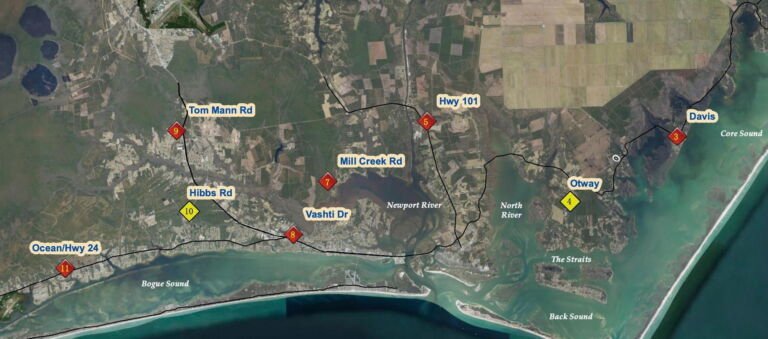North Carolina’s highest court could decide in the months ahead whether residents challenging Carteret County’s solid waste fees can proceed with a class-action suit.
The county is appealing Superior Court Judge Kent Harrell’s August 2024 decision allowing three different classes of plaintiffs in the dispute. That decision would expand the case beyond its four named plaintiffs.
Oral arguments in Armistead v. Carteret County are scheduled Sept. 10 before the North Carolina Supreme Court. The county’s attorney filed a motion this week to have those arguments delayed because of a scheduling conflict.
“In enacting N.C. Gen. Stat. § 153A-292(b), the Legislature reasonably concluded that counties should be able to charge fees to cover their costs in providing solid waste management services. However, the Legislature did not intend for counties to use their solid waste management services as a profit center. But that’s exactly what Carteret County has done for years and years,” the plaintiffs’ lawyers wrote in a brief filed Wednesday.
“The County does not collect waste, and it does not have a landfill,” the court filing continued. “It just provides 12 sites where residents can drop off their waste. Consequently, residents who don’t live in municipalities (which do collect waste) have to pay private companies to collect their waste and transport it to a transfer station owned and operated by a non-county entity for further transport to a landfill in Craven County. Carteret County plays no role at all in this solid waste collection and transport. Likewise, Carteret County plays no role in connection with the municipality-collected waste.”
“And yet, Carteret County — in violation of N.C. Gen. Stat. § 153A-292(b) and in one respect its own Ordinance — charges two separate fees for solid waste services to its property owners who are not using the County’s solid waste services but rather are paying either a private contractor or a municipality for those services,” the plaintiffs’ lawyers wrote. “Further, also in violation of N.C. Gen. Stat. § 153A-292(b), the County charges and collects more in these solid waste fees than it costs the County to operate the 12 solid waste disposal sites.”
“Until after this lawsuit was filed, these charges appeared on residents’ property tax bills with threats that failure to pay the bill could result in foreclosure,” the court filing continued. “No information was included about property owners not necessarily owing the fees or about how a property owner could challenge whether the fees were in fact owed. In the course of this litigation, no other county has been identified as having similar solid waste fee practices, nor do the County’s practices fit those described by the UNC School of Government as lawful practices employed by other counties.”
“Even since the lawsuit, the limited information Carteret County has provided its residents and the restrictive methods available for challenging the bill mean property owners are still paying for charges even when they don’t owe them. It should hardly be surprising that Carteret County has been making a profit off of these fees for years,” the plaintiffs alleged in their brief.
Issues in the case are “common to all potential class members,” the plaintiffs’ lawyers argued. “Further, resolution of those issues in a class action is the best way to ensure that the property owners are properly represented as a class and given an efficient means to recover the wrongfully assessed fees.”
The plaintiffs challenge two annual fees: a $15 landfill fee and a fee of $157-$165 to operate 12 “green box” sites where residents can dispose of waste, according to court filings.
Carteret County explained in an April 28 brief why the county challenges Harrell’s decision.
“Several private waste collections services operate within the incorporated and unincorporated areas of the County, several municipalities within the County offer waste collection services, and the County is aware of these services,” according to Carteret’s brief. “The Ordinance provides for an exemption from the Green Box Fee for taxpayers who have municipal or private solid waste collection services.”
“Plaintiffs contend that the County incorrectly charged the Green Box Fee to every owner of developed residential real property in unincorporated areas of the County and ‘many’ developed residential properties within incorporated areas of the County, and that the County did not provide taxpayers with notice or explanation of the Fees. However, as evidenced by Section 14-57 of the Ordinance, the exemption from the Fees requires the taxpayer to ‘produce an official statement from a permitted county solid waste collector, certifying that solid waste collection service was provided and paid for during the period billed,’ in which cases ‘the county tax administrator shall issue a release, or exemption from the annual disposal fee,’” the county’s court filing continued.
“Plaintiffs were never denied a release or exemption, rather they never asked for release or exemption by following a simple administrative remedy,” Carteret’s lawyer explained.
The county is asking the state Supreme Court to determine that Harrell’s class-action decision amounted to abuse of his discretion.


